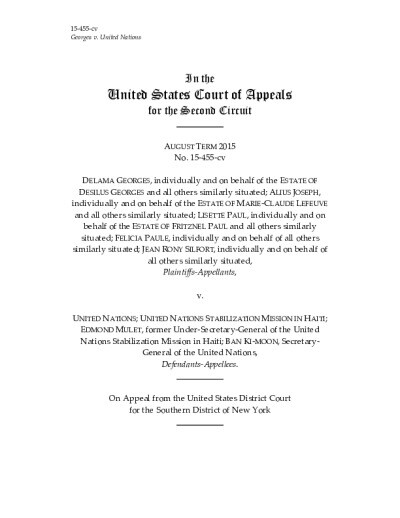
Date
Geographical Area
North America
Countries
United States of America
Keywords
Case Name
Georges & Ors v United Nations & Ors
Case Reference
No. 15-455 (2d Cir. 2016)
Name of Court
United States Court of Appeals for the Second Circuit
Key Facts
The appellants, Delama Georges and others, lived in Haiti and claim they or their relatives fell ill or died due to the cholera epidemic in 2010 and moreover that this epidemic was caused by United Nations (UN) personnel deployed to Haiti following the major earthquake which struck Haiti in January 2010.
They alleged that the UN deployed personnel from Nepal to Haiti without testing them for cholera, despite a surge in infections in Nepal at the time of their deployment. It was alleged that the Nepalese peacekeepers had poor sanitary systems in their base in Haiti, in particular that they permitted untreated sewage to flow into a tributary of Haiti’s primary source of drinking water, the River Artibonite, which lead to a massive outbreak of cholera in the country.
The US Government filed a “Statement of Interest” as an amicus curiae brief arguing that the defendants, i.e. the United Nations, were immune from the plaintiff’s legal process and suit due to the UN Charter. Consequently, the defendants did not make an appearance in the District Court of the Southern District of New York. The District Court subsequently dismissed the plaintiff’s action for lack of subject matter jurisdiction. The plaintiffs appealed to the US Court of Appeals for the Second Circuit.
They alleged that the UN deployed personnel from Nepal to Haiti without testing them for cholera, despite a surge in infections in Nepal at the time of their deployment. It was alleged that the Nepalese peacekeepers had poor sanitary systems in their base in Haiti, in particular that they permitted untreated sewage to flow into a tributary of Haiti’s primary source of drinking water, the River Artibonite, which lead to a massive outbreak of cholera in the country.
The US Government filed a “Statement of Interest” as an amicus curiae brief arguing that the defendants, i.e. the United Nations, were immune from the plaintiff’s legal process and suit due to the UN Charter. Consequently, the defendants did not make an appearance in the District Court of the Southern District of New York. The District Court subsequently dismissed the plaintiff’s action for lack of subject matter jurisdiction. The plaintiffs appealed to the US Court of Appeals for the Second Circuit.
Decision and Reasoning
The main issue was whether the UN’s dispute settlement obligations under s.29 of the Convention on the Privileges and Immunities of the United Nations (CPIUN) were a condition precedent for its immunity, as set out in s.2 of that Convention.
Section 2 CPIUN provides that the UN “shall enjoy immunity from every form of legal process except insofar as in any particular case it has expressly waived its immunity.” Applying the principle that express mention of one thing excludes all others, the court determined that the CPIUN provides that an express waiver was the sole circumstance were the UN would not have immunity.
In interpreting s.2, the court noted that previous case law held that conditions precedent must be expressed in plain, unambiguous language. The court also noted that no language clearly links the UN’s immunity from legal processes under s.2 to the obligations regarding dispute settlement in s.29 CPIUN.
With regards to the UN breaching s.29, the court argued that the plaintiffs lack the standing to raise this argument. The plaintiffs also argued that their constitutional rights to access the US Federal courts were violated by applying immunity in this case. The judgment notes that this argument does little more than question why immunities exist.
Section 2 CPIUN provides that the UN “shall enjoy immunity from every form of legal process except insofar as in any particular case it has expressly waived its immunity.” Applying the principle that express mention of one thing excludes all others, the court determined that the CPIUN provides that an express waiver was the sole circumstance were the UN would not have immunity.
In interpreting s.2, the court noted that previous case law held that conditions precedent must be expressed in plain, unambiguous language. The court also noted that no language clearly links the UN’s immunity from legal processes under s.2 to the obligations regarding dispute settlement in s.29 CPIUN.
With regards to the UN breaching s.29, the court argued that the plaintiffs lack the standing to raise this argument. The plaintiffs also argued that their constitutional rights to access the US Federal courts were violated by applying immunity in this case. The judgment notes that this argument does little more than question why immunities exist.
Outcome
The US Court of Appeals for the Second Circuit affirmed the District Court’s judgment of 15 January 2015 which dismissed the plaintiff's action due to a lack of subject matter jurisdiction under the CPIUN. It was affirmed that the appellees (the UN) were immune from legal process and suit in this case and that the plaintiff’s motion was moot.
Link
Disclaimer
This case law summary was developed as part of the Disaster Law Database (DISLAW) project, and is not an official record of the case.
Document
Document